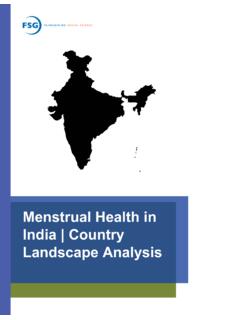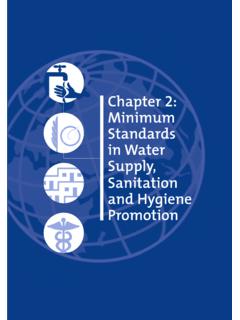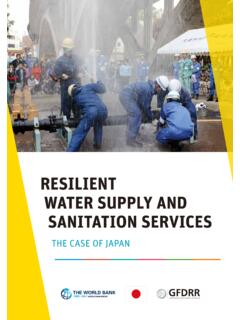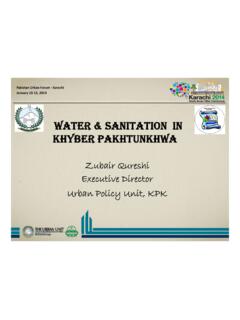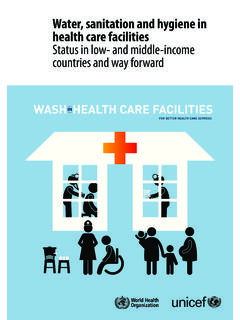Transcription of Rural Water Supply and Sanitation 2018
1 Rural Water Supply and Sanitation Project in Western Nepal Phase II 2018 Menstruation, WASH and RWSSP-WN Position Paper RWSSP-WN BRIEF 2-2018 MENSTRUATION, WASH & RWSSP-WN II: RWSSP-WN II Vision: The right to access to Water , Sanitation and hygiene for all means all, including menstruat-ing women and girls RWSSP-WN II Mission: "RWSSP-WN is commit-ted to address the social beliefs and stigmas sur-rounding menstruation while making Water , Sanitation and hygiene accessible and availa-ble for all, including menstruating women and girls. Working to-gether with local gov-ernments, schools and community groups, we believe in action that shows tangible results This Brief was developed by Ms. Sanna-Leena Rau-tanen, with contributions from Ms. Aura Liski, Ms. Kal-pana Dishwa, Ms. Sangita Khadka, Ms. Pamela White & Mr. Chandra Bista, Pro-ject Support Unit, RWSSP-WN II Date: WHY WASH PROJECTS NEED TO PAY ATTENTION TO MEN-STRUATION? Menstruation is a monthly reality and a biological fact for 2 billion women and girls worldwide.
2 Yet, in too many countries, women and girls face seri-ous challenges which may result in them being denied basic human rights. Menstruation has an impact on development as whole. It has implications on the life of girls and women in terms of health, education, work, mobili-ty and security, as well as overall quality of life and dignity. Rural Water Supply and Sanitation Project in Western Nepal Phase II (RWSSP-WN II) is a bilateral Water , Sanitation and hygiene (WASH) project. We take a rights-based approach into our work. RWSSP-WN II is committed to create an environment in which all commu-nity members, including the socially excluded, disadvantaged castes, ethnic and religious minorities, have equitable opportunities to pursue their right to Water and Sanitation , whether menstruating or not! Almost every woman and girl will menstruate on average every 28 days for about 5 days a completely normal biological process. Just as normal as the fact that many men will grow a beard.
3 Yet menstruation is steeped in silence, myths, taboos and even stigma. Women and girls the world over face numerous challenges in managing their menstruation. They may not have the means to do so, or face discriminatory cultural norms or practices that make it difficult to maintain good hygiene. Together, these challenges may result in women and girls being denied basic human rights and can turn a simple biological fact into a barrier to gender equality. (WASH United/Human Rights Watch, 2017:1) Menstruation & the human right to Water and Sanitation RWSSP-WN takes a rights-based approach to Water , Sanitation , and hy-giene. Menstruation should not impede a woman s rights. Menstruation links to the following rights (modified from Human Rights Watch, 2017): Human right to Water and Sanitation (access to both Water Supply & toilets, and with these, hygiene): Water and Sanitation services that comply with human rights obligations must meet the following criteria: be available, affordable, accessible, safe and acceptable for everyone, at all times.
4 This means that also women and girls, whether menstru-ating or not, have access to Water and Sanitation , at all times. Everyone has the right to live in a clean environment. Right to non-discrimination and gender equality: As long as women and girls need to sleep outside their homes, are forbidden to touch Water taps and use toilets during their periods and/or after child birth, for in-stance, there is no gender equality. Human right to education: No female teacher or a girl student should miss school days simply because they are menstruating! Education is a foundation for women empowerment and gender equality, and associ-ated with a wide range of development benefits. Human right to health: Right to health is compromised by being forced to go for open defecation, forbidden to use the Water taps or to sleep outside of home, and generally being left to practice poor menstrual hygiene management. These can have serious health impacts, even death. The menstruation-related challenges undermine RWSSP-WN s core thrust: access to Water and Sanitation for all.
5 In too many cases also in the West-ern Development Region of Nepal, women and girls are forbidden to use their Water and/or Sanitation facilities even if they exist (see below). What we know Use of toilets during menstrua-tion is an issue also in Western Nepal Earlier it was assumed that the more severe manifestations of taboos regard-ing menstruation were in far and mid-west Nepal. However, we are encoun-tering problems also in western Nepal. RWSSP-WN is conducting a survey on the use of toilets. As of January 4, the sample has 515 respondents from 5 districts of Western development region of Nepal (Baglung, Gulmi, Parbat, Rupandehi, Syangja). Out of these, 44% re-plied that they have not defecated in the open over the past 7 days. This means that more than half (56%) are still practicing Open Defecation even if these locations have been declared Open Defecation Free. One of the questions asked was whether there are specific days when the re-spondent or his/her family members do not use the toilet.
6 A total of 124 (24%) replied that yes, they or their family members are not using the toilet during menstruation. Out of these 124, there were 42 respondents who said that even if they had said that they didn t defecate in the open over the past seven days, they would still do so during menstruation. This increases the number of those who would not use the toilets from 56% to 64%. This is a significant finding considering the large sample size. The full study is expected to be available by Mid-March 2018 to guide the workplans already this year. WHY MENSTRUATION MATTERS? Education: Girls and female teachers may not attend school when menstruating. This is particularly evident in schools with inadequate WASH facilities. Health related risks: Unsafe and unhygienic Sanitation facilities for taking care of menstrual hygiene, and unhygienic materials to ab-sorb menstrual blood can lead to vaginal infections, with possible long-term ef-fects on reproductive health. Dignity & Psycho-social ef-fects: Menstruation is often associated with shame and disgust, resulting in negative attitudes.
7 Restrictive socio-cultural practices surround-ing menstruation are a bar-rier to gender equality. Productive work time: Wom-en may be constrained to pursue and maintain em-ployment when they are not able to manage their menstruation hygienically and in privacy at work. For instance, female teachers will miss working days during their period if forbidden to enter the school compound or restricted from using toi-lets. Environment: With lack of or limited waste manage-ment, non-reusable items are often disposed into the environment, adding to plastic waste. Safety: If women are forced to defecate outside during menstruation they face dangers of sexual violence or wild animals. Reference: Sida, 2016. Modi-fied for Nepal & WASH by RWSSP-WN II Menstruating women have the right to use the toilet and not have to face the discomfort and dangers of Open Defecation. Open defecation is also a problem for the health of the whole community. Therefore, it is ex-tremely important to create awareness and to get the facts right regard-ing menstruation, and to encourage women and girls to practice appro-priate MHM.
8 All this can be done within the existing project setup. The following framework takes the RWSSP-WN II existing Goal and Pur-pose as they are, and re-words the existing three key results to show how menstruation fits in. This Brief proposes some key Strategies (below and in the next pages). In practice, all this is work in progress when rolling out programs and activi-ties at the municipality level as ultimately it is the Municipality WASH Management Committees that will decide on their own programmes and work plans. Integrating menstruation issues into existing framework IMMEDIATE ACTION This Position paper acknowledges that RWSSP-WN Phase II has only years remaining. This means that we need to: Integrate results-oriented actions into existing framework & strategies, workplans & budgets immediately. Apply Menstruation is-sues to all aspects of WASH - it is more than MHM for us. Produce evidence-based knowledge prod-ucts to have targeted actions, and that can directly contribute to the national policies & frameworks.
9 Identify strategic part-nerships that can carry on after the Project has phased out. Photo: Women in Rolpa discuss-ing the Water scheme layout. Location of the tap stands, even within the premises, counts! All, also menstruating women, must be able to use the taps! GOAL: Improved health and fulfilment of the equal right to Water and Sanitation for the inhabitants of the Project areaSTRATEGIC OBJECTIVE: Ensurethat menstruating women and girls have access to improved Water , Sanitation and hygieneRESULT : Access to Sanitation and hygiene also for menstruating women& girls achieved and sustained RESULT 2:Access to safe, functional and inclusive Water Supply services also for menstruating women& girls achieved and sustained RESULT 3:Strengthened institutional capacity of government bodies to plan, coordinate, support & monitor that also menstruating women have access to Water , Sanitation &hygiene MHM related issues mainstreamed into all sessions to create awareness and for breaking taboos -it should be as easy to talk about MHM as it is now easy to talk about defecation.
10 Each Sanitation /total sanitationrelated event include MHM. Flexes displayed every time there is an event. Total Sanitation indicator forwaste disposal considers also proper management of menstrual waste. MHM Kit available in each M-WASH Unit Promote toilets (both private, public, institutions & schools)that are gender& menstruationfriendly (privacy, door lock, dustbin or other waste disposal opportunity, Water available inside the toilet). Water is accessible inside the toilet for all, including menstruating women. Water is available for various hygiene related practices, including washing of re-usable pads. Organize menstruation related female-only session to WUSC members & their close stakeholders. Display MHM & Human Rights awareness poster/flex in every Water scheme monitoring event, together with the other flexes. Distribute MHM & Human Rights brochures to Municipality level stakeholders Step-by-Stepprocess includes session for discussing thelocation, access to and use of the Water taps by all at all times (including menstruating women, children, disabled etc.)
